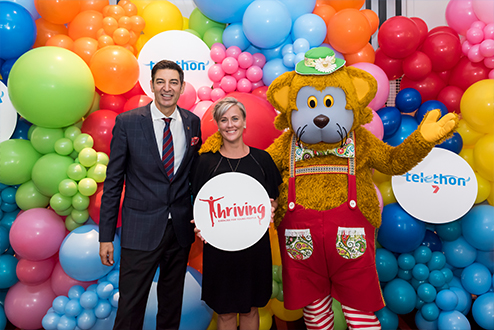Two alumni, from the School of Human Sciences, are having an impact on the health of diverse Australian communities and making changes to improve exercise programs for those at risk of mental health conditions.
Associate Professor Caitlin Wyrwoll (BSc (Hons) '03, PhD '08) examines the environmental effects on health during pregnancy and how environmental change or stressors influence the mother’s health and the babies’ health from birth to later in life.
As a research co-lead of a large environmental health network, Associate Professor Wyrwoll leads a project that examines the effects of drinking water quality on health outcomes in Australia and what it means for pregnancy complications.
“Many people are probably not aware that in remote and regional Australia water quality is very poor and there are large inequities in access to safe drinking water,” Associate Professor Wyrwoll said.
Recent funding from the Channel 7 Telethon Trust and The Stan Perron Charitable Foundation has enabled Associate Professor Wyrwoll to generate preliminary data from the research.
Currently, the research is based on Wongatha country, in the Goldfields region, however the outcomes apply throughout Australia.
“A lot of regional and remote areas are reliant on groundwater as a source of drinking water and as a consequence there’s a lot of naturally occurring contaminants,” Associate Professor Wyrwoll said.
“Of particular interest to my research is nitrate, which is prevalent in some groundwater sources particularly throughout Western Australia, because of the decomposition of organic materials over thousands of years.”
Formally trained as a discovery scientist working with experimental models in laboratories, Associate Professor Wyrwoll was grateful to be given the opportunity to work on Wongatha country.
“I met with leading research collaborators; Christine Jeffrey Stokes, a Kalgoorlie based paediatrician, and Annette Stokes, an Aboriginal researcher and Wongatha elder,” Associate Professor Wyrwoll said.

While the research includes wide expertise and is impactful, Associate Professor Wyrwoll said there is no easy solution.
“It’s one of these ‘wicked problems’ where building multidisciplinary partnerships with organisations will be key,” she said.
This includes collaborations with Dr Sarah Bourke, a hydrogeologist at UWA School of Earth Sciences, WA Department of Health and Water Corporation WA.
Associate Professor Bonnie Furzer (BA/BSc (Hons) '08, PhD '13, GradCertTerTeach '18) is an accredited exercise physiologist in the School of Human Sciences who examines the way we can use exercise, in all its forms, to improve the health and social outcomes of people who are at risk or diagnosed with a mental health disorder.
Exploring various projects from all stages of the human life cycle, Associate Professor Furzer works as a Senior Exercise Physiologist at the Fremantle Hospital Mental Health Service, looking to improve health outcomes across acute inpatient and community-based care pathways.
 Image: Associate Professor Bonnie Furzer at the 2021 Telethon Giving Ceremony for her organisation Thriving in Motion.
Image: Associate Professor Bonnie Furzer at the 2021 Telethon Giving Ceremony for her organisation Thriving in Motion.
“The underlying investigation for my research and my team in all our studies is not so much looking at whether exercise is good, we know it has positive impacts on health, but we’re looking at exactly when and how and what the magnitude of benefits are,” Associate Professor Furzer said.
“More importantly, how to make exercise accessible and possible for everyone to participate in a safe and positive way."
One project she is currently working on is how exercise professionals and community services can support positive exercise and eating behaviours in transgender adults and young people.
“This vulnerable cohort are at significant risk of eating disorders, mental illness and suicide and we aim for impactful recommendations in using positive movement experiences as early intervention and prevention for the challenges they face," she said.
“For example, transgender young people may want to be active but don’t know how or experience socio-cultural barriers to participation.
“The simple idea of even joining a sporting club or a gym can be very difficult or impossible.”
Associate Professors Furzer and Wyrwoll are two UWA lecturers looking to improve the teaching content around LGBTIQA+ contexts in the Human Sciences curriculum.
“Teaching reproductive biology traditionally comes from a heteronormative and binary context,” Associate Professor Wyrwoll said.
“We’ve been reflecting on the curriculum, highlighting and reworking how we are teaching and how labs are run, to capture the normal variation in gender identity and sexual orientation.
“The outcomes of these changes on student experience has been impactful and the teaching team were recently recognised with a UWA Learning and Teaching Award for Outstanding Contributions to Student Learning.”
Associate Professor Furzer teaches the Masters of Clinical Exercise, which covers the context of diversity and inclusion and what that means for students when they are working as allied health professionals.
“We’re looking to increase the understanding, knowledge and the confidence of students’ work across inclusive practice, including gender, cultural and language diversity, neurodivergence and social-economic diversity in the Master’s program,” she said.
“The industry has a need for respectful and inclusive health professionals and what we do really well is cover learning and content during workshops within course, which are all supported by clinical placements that are embedded in various communities and settings reflective of inclusive practices.”
